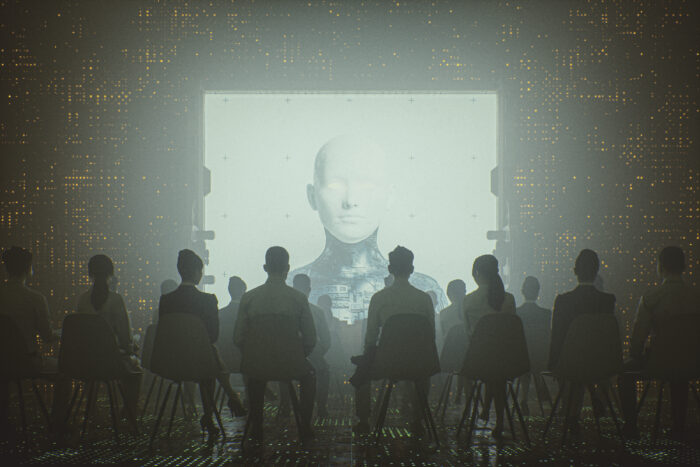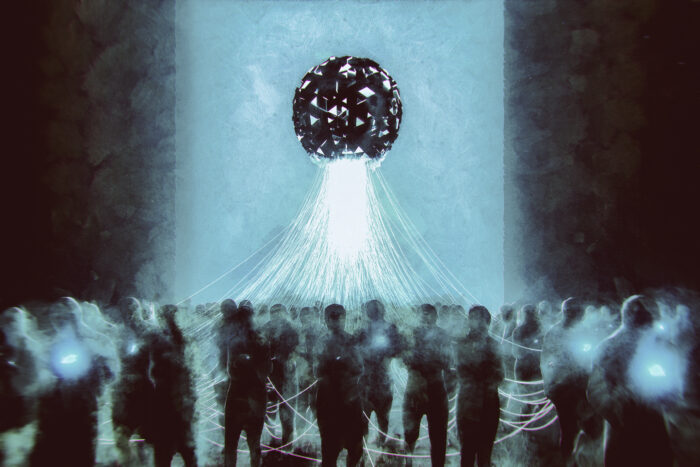I’ll Show You How Deep The Internet Darkness Goes
You likely don’t need me to persuade you that something is terribly wrong with the internet. Especially if you are a fellow computer geek, you’ve encountered the web’s dark underbelly. Even casual users can easily find digital examples of the Seven Deadly Sins—such as pride, wrath, greed, and lust.
As I explored in my previous article, “Marvel With Me at the Internet’s Origin Story,” cyberspace was supposed to be a magical world where we could just have fun. But do you ever feel like it’s been corrupted and become dangerous?
Let’s Terraform the Internet: the series
Fantastical stories can give us a better picture of what has happened, and maybe even how to solve the problem.
Star Trek: The Next Generation’s second season episode “Q Who?” introduced the Borg, giving viewers a stern warning against marrying our flesh to technology. Later, The Matrix (1999) predicted an artificial superintelligence that would enslave our minds within a simulated reality and use our bodies to provide itself energy. And the role-playing game Shadowrun prophesied the internet’s dark battlefield.
Technological miracles become horror stories
The Borg’s entrance showed a stark departure from the Federation’s otherwise optimistic world. Before this discovery of half-man, half-machine creatures who assimilate entire worlds, humans may have felt there was no frontier we shouldn’t explore and no problem technology could not solve. But these hordes of cybernetic zombies portrayed the tragic consequence of devotion to the Myth of Progress.
In the real world, perhaps the biggest change between my childhood’s internet and today’s internet is the all-encompassing nature of technology. True, we may not yet have brain implants (perhaps we never will) or robotic appendages. But what is a smartphone, other than a handheld nanoprobe?
When I was growing up, our house had a dedicated room where our internet was accessible but also contained. Now, the internet lives in my refrigerator. It’s on my wrist. It’s something my brain can’t function without. Essentially, I have become a cyborg, and so have you.
The internet is no longer a place we visit, but a world where our minds live. Pastor Sam Allberry made a chilling prediction at the pandemic’s beginning, about what would become a year-long disembodied existence for many of us:
“Maybe God is giving us exactly what we’ve been wanting. We’ve prioritised individualism over community, the material over the relational, the virtual over the physical. And now we have it. More than we can likely manage.”1
Indeed, our attempts to live mostly online have proved harmful to our physical and mental health. There’s a reason the Borg walk so slow and look so dead. If you form your identity through an interconnected hive mind, that will kill your soul. The more we become part of cloud-based collectives, what becomes of our individuality?
 The giants of Silicon Valley
The giants of Silicon Valley
The Matrix told a futuristic story as old as time: Man versus His Own Creation. Big Tech’s creation of infrastructure and algorithms, to bring us convenience and comfort, have instead enslaved us. In the real world, our attention and emotions are encased in pods that are plugged into a bioelectric power plant of sorts. Only a few mega-corporations control this power, along with $1.2 trillion in annual revenue. They are not just wise leaders from Silicon Valley. They are Silicon Giants.
The Silicon Giants have promised to improve commerce, communication, relationships, and even romance. They bestow blessings but also demand sacrifices. How often have you felt pressured to give up your privacy, concentration, happiness, or sleep?
“Technology companies are locked in an arms race to seize our attention, and that race is tearing apart the social fabric.”2
In The Matrix, Morpheus begins a training session with Neo and explains that the Matrix itself is the enemy, not the people trapped inside. In our reality, this system of algorithms seems to clash against embodied humanity. Incessant notifications or fear of missing out constantly tempt us to leave our bodies behind and numb ourselves inside cyberspace.
Familiar shadows
Still, we can’t blame all our bad behaviors on Big Tech or dark patterns. The internet’s darkness originates from our own hearts. Haven’t you enjoyed the video game of rhetorically destroying someone? We’ve turned this once magical world into a militarized zone. Tech companies simply feed off our rage, boredom, and loneliness.
The role-playing game Shadowrun portrayed this reality clearly and bleakly. The game’s cyberworld showed a place of surveillance and subterfuge. The Deckers who roamed through digital spaces battled one another as often as they fought artificial intelligences, often in the service of the megacorps.
Back in our real world, we face ransomware attacks on critical infrastructure, such as oil pipelines and the world’s largest meat company. We even have a $250 billion black market fueled by attacks on our personal information.
Still, while spectacular attacks grab headlines, most of us are deeply affected by mundane online warfare. Social media conversations get hijacked and spiral out of control. Our default communication mode is no longer face-to-face, peer-to-peer, or peer-to-group, but peer-to-collective. Do you see the shadowy forces at play?
Christians can redeem the internet
We may not be physically trapped in a digital simulation. But too often we fall into analogue simulations. The good news? We have a way out. The internet can be fun again, and Christians have a unique opportunity to lead the way. In my third and final article, I’ll share some escape routes and maps to digital enclaves.
- Sam Allberry, on Twitter (March 26, 2020). ↩
- Tristan Harris, co-founder and president of the Center for Humane Technology. ↩






























I shall quote a lyric from Sting that says it all:
“I have never seen a miracle of science,
that hasn’t gone from a blessing to a curse.”
That quote from Sam Allberry is ??
I appreciate the connections you make here and am looking forward to hearing from you in the 3rd article. I’m thinking about this more and more as well.